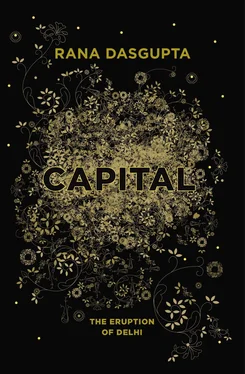A great warrior and son of the king’s first wife, Rama grows up as heir to the Ayodhya throne. The second wife, however, gets the king to grant her an unconditional request, which she redeems thus: Rama should be sent into exile so that her own son, Bharata, might take the throne. The promise may not be withdrawn but Rama raises no protest: he departs with his wife, Sita, and his brother, Lakshmana, to endure years of unhappiness and hardship in the forest. During this time, Rama meets a wandering widow, Surpanakha, who falls in love with his beauty. She approaches him amorously but he tells her he is married to Sita and rejects her; he and Lakshmana then begin to make fun of her for her ugliness. Surpanakha attacks Sita out of jealousy and Lakshmana cuts off her nose.
Surpanakha, however, is the sister of the great demon, Ravana, whose wrath is aroused by this disfiguring of his sister. He abducts Sita and takes her away to his spectacular palace in Lanka. Ravana, who has acquired his power through scholarship and devotion to Shiva, attempts to seduce Sita with promises of wealth and luxury, but she rejects all his advances. Eventually Rama and Lakshmana invade Lanka with the help of the monkey god Hanuman, kill Ravana and rescue Sita.
But Rama is plagued by doubts as to what might have happened between Ravana and Sita while she has been away, and he refuses to take her back. Weeping, Sita decides to demonstrate her purity by plunging into fire. She emerges from the fire unharmed, Rama is overjoyed and returns with Sita to Ayodhya where he is given his rightful throne and the era of virtue begins.
The people of Ayodhya, however, are unnerved by the example Rama has set: they feel that the women of the kingdom will be corrupted if they see their king welcome back a wife who has lived with a demon. Having not the confidence of his own independent judgement, Rama exiles Sita to the forest, where she gives birth to his twin boys and is taken in by a sage. When Rama later encounters the sage and hears news of Sita and their children, he is moved by the memory of his wife, and he asks her to come to him and prove, once again, her virtue. The sage swears that she has been true to him, and all the gods descend from heaven to say the same, but Rama still requires more assurance. Sita says, “As truly as I have never, even with one thought, contemplated another man than Rama, may Goddess Earth open her arms to me!” — and with that the earth opens and she is swallowed up. Nothing short of Sita’s death can convince Rama, apparently, that she is pure: now his love floods out of him unrestrainedly and he prays for her to be restored to him, but it is too late.
Rama is a character of extraordinary drives, no doubt: his willingness to abandon his political ambition to subsist in the forest demonstrates a startling commitment to the word of his father. But one cannot help feeling that there is something missing from Rama, even in this: is his obedience not rather obsessive, as if he lacks vision and is looking for some cause, even a negative one, so as not to be lost? Does he not seem like someone empty of values who therefore becomes brittle and loveless, and an extremist of rules? He is a severe character, Rama, who leaves one rather cold: he says little, and almost nothing that might inspire or warm. He is most content in self-denial: it is not amid the adversity of the forest but precisely when everything is restored to Rama — his wife, his city and his throne — that he begins to fall apart. Though he will fight fanatically for the recovery of his wife — because he understands the offence of a broken rule — when she comes home to him he hates her, not for what she has done but what has been done to her. It is dangerous to be loved by a man like this: he may raise armies for you when you are stolen away, but when you are by his side he is plagued by suspicions and spite. He is haunted by the idea that others may not have denied themselves as he has, by visions of the extravagant pleasures that they might enjoy.
It is interesting that one hardly ever sees the name of Krishna written up in the back window of a car, for the eighth avatar of Vishnu would seem, on the face of it, a far more attractive ego ideal than the seventh. Where Rama is perfect according to custom, Krishna is theoretically and theologically so: he is the ‘perfect incarnation’, incorporating all sixteen attributes of human perfection. Rama displays only thirteen; the three he lacks are: an unparalleled capacity for romantic love, an irresistible skill in music, and an extraordinary sweetness and sensuousness of personality. 25Like Rama, Krishna is a warrior and a man of wisdom and moral seriousness, but he also has all the humour, eloquence and breadth of spirit that Rama lacks. He is unabashed about his sensuousness and his desires: his love for women is erotic and overpowering, and he knows the poetic ache of yearning for a lover far away. Like Rama, Krishna is beautiful, but women who desire him end up not with their noses cut off but loved and serenaded by the music of his flute.
But despite the immense numbers of his erotic conquests, there is something almost effeminate about Krishna’s sentimental plenitude, his flute playing in the woods. Is this why he fails to be a satisfying mascot for our go-getting age? Or at least for its men? Go to celebrations of the major Krishna festivals and you will be surrounded by women and children looking at images of a playful infant and a flute-playing, sensitive man. It is at the festivals of Rama that you will find men in the lead, setting their flames, for instance, to the effigies of Ravana set up for the night of Dussehra. It occurs to me that, if ‘Rama’ is written up in the back of so many car windows in Delhi, it may not only be because he is a remote and unattainable hero. It may be also because he is someone very close, someone touchingly flawed, someone whose outbursts of spasmodic violence, precisely, make him a reassuringly familiar role model.
• • •
Colonised countries often imagine their liberation in terms of phallic recovery. Excluded from the government of their country under the British, campaigners for India’s self-rule complained of the Indian male’s political emasculation and infantilisation, and longed for a time when he could be made complete again. At just the moment when the dreamed-of recovery arrived, however, and Indians assumed political control of their own nation, they were, in this northern part of the country, unmanned forever, and in far more lurid and unforgettable ways. Some were literally castrated in the violence of Partition; many more had their male mastery outrageously mocked as their women were raped, murdered, disfigured and carried away. The gnawing emasculation of colonialism had proved to be temporary, but it had ended in a violent carnage whose genital mutilations, real and figurative, were impossible to reverse. It is the memory of these wounds that provides historical depth to everything we have seen about the fragility of north Indian men, who leave their women pining for the emotional completeness of men from Bombay — or other, more far-flung locales.
For many north Indian families, the abduction of women, especially, is not merely a mythological tale. Tens of thousands of women were seized during the partition, and they remained with their captors while the rest of their families travelled to the other side of the new border.
If the new state of India was so concerned to recover abducted Sikh and Hindu women from Pakistan it was because Indian manhood depended on it: as mythology made clear, there was no male duty more essential than the rescue of a stolen woman. Just as each individual abduction was an insult to a father or a husband, the totality of abductions was seen as an insult to the authority of the state; and it was essential for the new nation’s sense of its own virility that the lost women be brought home. The Congress declared in November 1947:
Читать дальше











